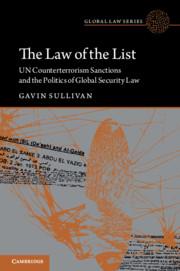
-
Select format
-
- Publisher:
- Cambridge University Press
- Publication date:
- 24 April 2020
- 23 April 2020
- ISBN:
- 9781108649322
- 9781108491921
- 9781108741323
- Dimensions:
- (228 x 152 mm)
- Weight & Pages:
- 0.68kg, 394 Pages
- Dimensions:
- (229 x 152 mm)
- Weight & Pages:
- 0.586kg, 398 Pages
- Series:
- Global Law Series
Book description
The spread of violent extremism, 9/11, the rise of ISIL and movement of 'foreign terrorist fighters' are dramatically expanding the powers of the UN Security Council to govern risky cross-border flows and threats by non-state actors. New security measures and data infrastructures are being built that threaten to erode human rights and transform the world order in far-reaching ways. The Law of the List is an interdisciplinary study of global security law in motion. It follows the ISIL and Al-Qaida sanctions list, created by the UN Security Council to counter global terrorism, to different sites around the world mapping its effects as an assemblage. Drawing on interviews with Council officials, diplomats, security experts, judges, secret diplomatic cables and the author's experiences as a lawyer representing listed people, The Law of the List shows how governing through the list is reconfiguring global security, international law and the powers of international organisations.
Awards
Winner, 2021 Best Book Award, Science, Technology and Art in International Relations Section, International Studies Association
Winner, ILAW Section Best Book Award 2020, International Studies Association
Winner, 2021 ILAW Book Award, International Studies Association
Shortlisted, 2021 Early Career Researcher Book Prize, Socio-Legal Studies Association (SLSA)
Reviews
‘The Law of the List carefully traces the emergence of global security law through sites of global governance where legal and security practices are reassembled. Both theoretically and methodologically, the book will be indispensable reading for scholars and students researching contemporary security governance.’
Claudia Aradau - Professor of International Politics, Department of War Studies, King’s College London
‘The Law of the List is an important contribution to a new generation of socio-legal scholarship on international and global law.’
Nehal Bhuta - Chair of International Law, University of Edinburgh
‘Gavin Sullivan brings to life the mundane technicalities of UN Counterterrorism Sanctions. His synthesis of actor-network theory, Foucauldian genealogy, multi-sited ethnography and socio-legal studies illuminates the intricate politics of global security law, and expands our vision of international law.’
Annelise Riles - Director of the Roberta Buffett Institute for Global Studies, Northwestern University
‘Sullivan’s laboratory study of the regulatory architecture that is both shaped by and shaping these forces of alienation, exclusion and control, offers an extremely perceptive critique of a world of words and actions that has become increasingly undecipherable - and, unbearable.’
Peer Zumbansen - Inaugural Chair of Transnational Law and Founding Director, Transnational Law Institute, King’s College London
‘Sullivan (Edinburgh Law School, Univ. of Edinburgh, UK), a lawyer who has assisted many clients who have been targeted by such lists, combines his experiences with interviews of officials to explore this opaque and confusing law practice. In doing so he provides a unique service to researchers and practitioners. This is not a book for everyone, but for those who need it, it is invaluable … Highly recommended.’
D. McIntosh Source: Choice
‘… the work underlines how, and to which extent, law and legal considerations help shape and structure international politics and global diplomacy - and that should reflexively feed into further theorizing by lawyers and social scientists alike.'
Dr. Morag Goodwin Source: International Organizations Law Review
Contents
Metrics
Altmetric attention score
Full text views
Full text views help Loading metrics...
Loading metrics...
* Views captured on Cambridge Core between #date#. This data will be updated every 24 hours.
Usage data cannot currently be displayed.
Accessibility standard: Unknown
Why this information is here
This section outlines the accessibility features of this content - including support for screen readers, full keyboard navigation and high-contrast display options. This may not be relevant for you.
Accessibility Information
Accessibility compliance for the PDF of this book is currently unknown and may be updated in the future.


